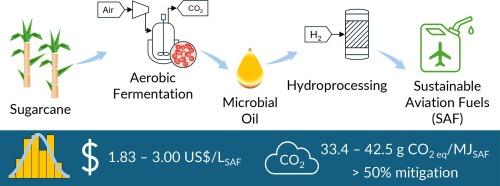Alternative feedstocks for sustainable aviation fuels: Assessment of sugarcane-derived microbial oil
IF 9.7
1区 环境科学与生态学
Q1 AGRICULTURAL ENGINEERING
引用次数: 0
Abstract
Pioneer facilities for Sustainable Aviation Fuels (SAF) convert fats, oils, and grease into hydrocarbons using the Hydroprocessed Esters and Fatty Acids (HEFA) technology. However, limited feedstock availability and sustainability concerns may restrict broader adoption. Biotechnology offers an alternative by enabling microbial oil production from sugars, expanding the feedstock portfolio with more productive biomass sources or waste materials. This study assessed the economic and environmental impacts of SAF production through HEFA using microbial oil from sugarcane, combining achievable fermentation performance with mature catalytic conversion. The results demonstrated SAF costs between $1.83 and $3.00 per liter and over 50 % reduction in greenhouse gas emissions compared to fossil fuels. Sensitivity analysis identified fermentation performance as the key factor driving these outcomes. Additionally, this approach yielded higher SAF per hectare than soybean-oil-based HEFA, potentially reducing emissions from land-use change.

可持续航空燃料的替代原料:评估甘蔗衍生微生物油。
可持续航空燃料(SAF)的先驱设施利用加氢处理酯和脂肪酸(HEFA)技术将脂肪、油和油脂转化为碳氢化合物。然而,有限的原料供应和可持续性问题可能会限制更广泛的应用。生物技术提供了一种替代方法,即利用微生物从糖类中生产油脂,并利用更高产的生物质来源或废料扩大原料组合。本研究评估了利用甘蔗中的微生物油通过 HEFA 生产 SAF 的经济和环境影响,将可实现的发酵性能与成熟的催化转化相结合。结果表明,与化石燃料相比,SAF 的成本在每升 1.83 美元到 3.00 美元之间,温室气体排放量减少了 50%以上。敏感性分析表明,发酵性能是产生这些结果的关键因素。此外,与基于大豆油的 HEFA 相比,这种方法的每公顷 SAF 产量更高,有可能减少因土地使用变化而产生的排放。
本文章由计算机程序翻译,如有差异,请以英文原文为准。
求助全文
约1分钟内获得全文
求助全文
来源期刊

Bioresource Technology
工程技术-能源与燃料
CiteScore
20.80
自引率
19.30%
发文量
2013
审稿时长
12 days
期刊介绍:
Bioresource Technology publishes original articles, review articles, case studies, and short communications covering the fundamentals, applications, and management of bioresource technology. The journal seeks to advance and disseminate knowledge across various areas related to biomass, biological waste treatment, bioenergy, biotransformations, bioresource systems analysis, and associated conversion or production technologies.
Topics include:
• Biofuels: liquid and gaseous biofuels production, modeling and economics
• Bioprocesses and bioproducts: biocatalysis and fermentations
• Biomass and feedstocks utilization: bioconversion of agro-industrial residues
• Environmental protection: biological waste treatment
• Thermochemical conversion of biomass: combustion, pyrolysis, gasification, catalysis.
 求助内容:
求助内容: 应助结果提醒方式:
应助结果提醒方式:


